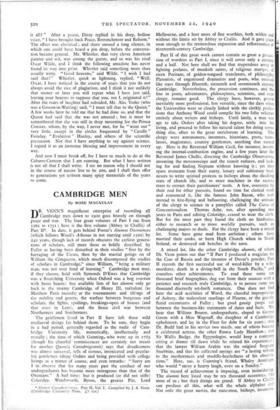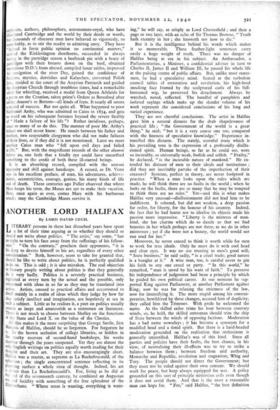CAMBRIDGE MEN
By ROSE MACAULAY
DR. VENN'S magnificent enterprise of recording all Cambridge men down to 1900 goes bravely on through peace and war. The four great volumes of Part I ran from 1261 to 1751 ; here is the first volume (Abbey to Challis) of Part II*. In date, it gets behind Foster's Alumni Oxonienses (which follows Wood's Athenae in not starting until 15oo) by 240 years, though lack of records obscures the earliest genera- tions of scholars, still more those so boldly described by Fuller as having been disturbed in their studies "first by the harraging of the Danes, then by the martial goings on of William the COnqueror, which much discomposed the studies of scholars in Cambridge," since William, "being a military man, was not over fond of learning." Cambridge men may, if they choose; hold with Symonds D'Ewes that Cambridge_ was a flourishing University when Oxford was a bog overrun with brute beasts: but available lists of her alumni only go back to the stormy Cambridge of Henry III, turbulent (as Matthew Paris records) at the tournaments and tilting,s of the nobility and gentry, the warfare between burgesses and scholars, the fights, spoilings, breakings-open of houses (and that even in Lent), and the fierce civil war between Northerners and Southerners.
The gentlemen listed in Part H have left these wild mediaeval doings far behind them. To be sure, they begin in a bad period, generally regarded as the nadir of Cam- bridge University life, numerically, intellectually and morally ; the time of which Gunning, who went up in 1785 (though his cheerful reminiscences are certainly not meant for another Quere:a Cantabrigiensis) says that drunkenness was almost universal, tells of riotous, intoxicated and peculat- ing gentlemen taking Orders and being provided with college livings as a matter of course, and even remarks: "Sorry am I to observe that for many years past the conduct of our undergraduates has become more outrageous than that of the Oxonians." A bad time: but it produced (or did not stifle) Coleridge, Wordsworth, Byron, the greater Pitt, Lord * Alumni Cantabrip'enses. Part II, Vol. I. Compiled by J. A. Venn. (Cambridge University Press. £7 los.) Melbourne, and a host more of fine worthies, both within and without the limits set by Abbey to Challis. And it gave place soon enough to the tremendous expansion and reflorescence of nineteenth-century Cambridge.
Part II of this great work cannot contain so great a proces. sion of worthies as Part I, since it will cover only a century and a half. Not here shall we find that stupendous array of fighting prelates, of monkish saints, of religious martyrs, of stern Puritans, of golden-tongued translators, of philosophic Platonists, of engeniused dramatists and poets, who coursed like stars through fifteenth, sixteenth and seventeenth century Cambridge. Nevertheless, the procession continues, and the line in poets, adventurers, philosophers, scientists, and even clergy, remains good. The clergy have, however, grD.vri inevitably more professional, less versatile, since the days when the Universities were so closely linked with the clerkly profes- sions that Anthony Wood could compile his two folio volumtt entirely about writers and bishops. Until lately, a man was apt to take Orders after taking his degree, settle into his living, and proceed to follow his natural talent for doing some- thing else, often to the great enrichment of learning. The clergy were astronomers, inventors, historians, poets, trans- lators, magistrates, country gentlemen, anything that turned up. Here is the Reverend William Cecil, for instance, invent- ing the internal-combustion engine, and a few years later the Reverend James Challis, directing the Cambridge Observatory, inventing the meteoroscope and the transit reducer, and look- ing for and finding Neptune without knowing it ; yet they spare moments from their starry, lunary and sublunary busi- nesses to write spirited protests to bishops about the shocking state of church life, and to erect machines in the rectory trees to extract their parishioners' teeth. A few, overcome by their zeal for other pursuits, found no time for clerical work and renounced it, like the famous John Bacon, who took instead to kite-flying and ballooning, challenging the attitude of the clergy to science in a pamphlet called The Curse of Conventionalism. Thomas Ashe, too, after spending two years in Paris and editing Coleridge, ceased to wear the dolt. But for the most part they found the cloth no hindrance, either to research or to more worldly pursuits, such as challenging majors to duels. For the clergy have been a mixed lot. Some have gone mad from ambition ; others have married their cooks, or been High Church when in North Ireland, or destroyed oak benches in the nave.
A mixed lot, like the other Cambridge alumni, of whom Dr. Venn points out that "If Part I produced a magician for the Czar of Russia and the inventor of Dover's powder, Part II records the first successful use of weed-killer by a wife- murderer, death in a diving-bell in the South Pacific," and countless other achievements. To read these some ten thousand brief biographies, dug out from their sources with a patience and research truly Cambridge, is to peruse some ten thousand discreetly set-forth romances. One does not find here the acid acerbities of Wood, the cheerful improprieties of Aubrey, the malevolent snarlings of Hearne, or the gravely florid encomiums of Fuller ; but good gossip peeps out between the business-like statements of dates and facts. We hear that William Bruere, undergraduate, eloped to Gretna Green with a Miss Wagstaff, the daughter of .a Cambridge upholsterer, and lay in the Fleet for debt for six years ; that Dr. Budd had in his service two maids, one of whom became a celebrated actress, the other Emma Lady Hamilton.; that Sir Wallis Budge, the Egyptologist, would keep a company sitting at dinner till dawn while he related his experiences ; that the lawyer William Arabin was the original Sergeant Snubbins, and that his collected sayings are "a lasting tribute to the incoherences and muddle-headedness of his observa- tions." Here, too, is Gunning's friend, Whaley Armitage, who would "enjoy a hearty laugh, even on a Sunday." The record of achievement is imposing, even intimidating. The alumni here listed may be ten thousand eccentrics, Ile most of us ; but their doings are grand. If Abbey to Dani.! can produce all this, what • will the whole alphabet do? Not only the great names, the statesmen, bishops, inventors, explorers, authors, philosophers, astronomers-royal, who have illustrated Cambridge and the world by their deeds or words, but thousands of obscurer men have behaved so vigorously, so remarkably, as to stir the reader to admiring envy. They have "helped to form public opinion on continental matters," revived the Kirklevington shorthorns, succeeded in always having in the partridge season a beefsteak pie with a brace of partridges with their breasts down on the beef, obtained mysterious D.D.'s from abroad, compiled lunar tables, improved the navigation of the river Dee, gained the confidence of Persians, mystics, dervishes and Kalandars, converted Polish Jews, resided at the court of the Assyrian Patriarch and guided the Assyrian ChurCh through troublous times, had a remarkable talent for whistling, received a medal from Queen Adelaide for a poem on the Creation, taken priest's Orders as Beresford after taking deacon's as Bottom—all kinds of feats. It nearly all seems a record of success. But not quite all. What happened to poor Nathaniel Arthy, who was admitted to Caius in 1854, and gets no word on his subsequent fortunes beyond the severe finality of "Made a failure of his life "? Rather invidious, perhaps, since so many of us do this. The manner of poor Mr. Arthy's failure we shall never know. He stands between his father and brother, two respectable clergymen who did not make failures of their lives, or if they did it is not mentioned. Later we meet another Caius man who "fell upon evil days and failed in life." But, with the magnificent records of the other alumni before us, one feels that a kindly eye could have unearthed something to the credit of both these ill-starred beings.
It is an absorbing record, compiled with the utmost ingenuity and skill against handicaps. A record, as Dr. Venn says in his excellent preface, of man, his adventures, achieve- ments, eccentricities, courage, genius, his many kinds of life and of death. Three centuries ago Fuller observed that where Mars keeps his term, the Muses are apt to make their vacation. Here, once again as ever, comes Mars with his barbarous attack: may the Cambridge Muses survive it.



























































 Previous page
Previous page